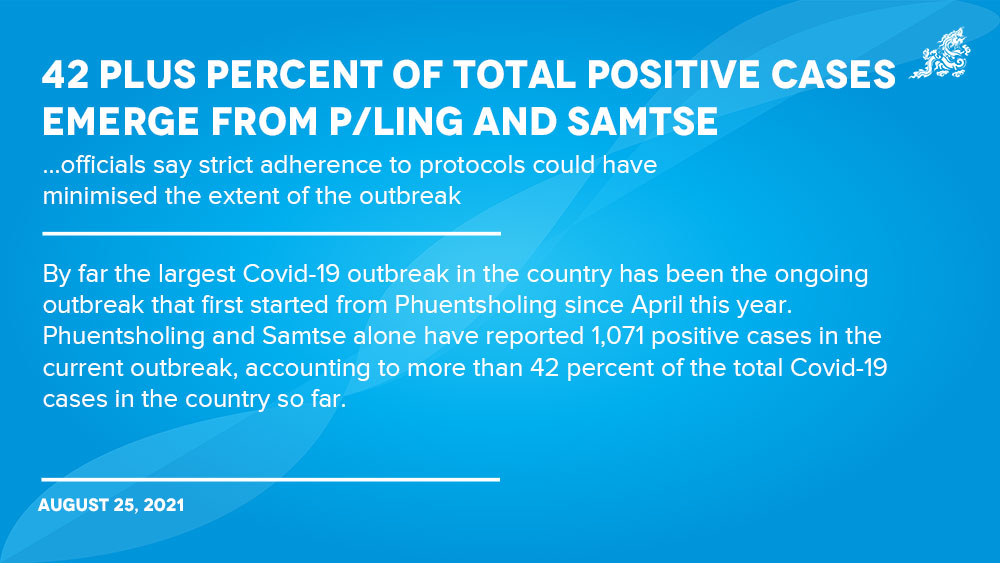…officials say strict adherence to protocols could have minimised the extent of the outbreak
Younten Tshedup
By far the largest Covid-19 outbreak in the country has been the ongoing outbreak that first started from Phuentsholing since April this year.
Phuentsholing and Samtse alone have reported 1,071 positive cases in the current outbreak, accounting to more than 42 percent of the total Covid-19 cases in the country so far.
Following the detection of the first two positive cases of the ongoing outbreak on April 16, Phuentsholing, as of last night, has reported 630 positive cases, including 190 from the community. Samtse reported 441 cases — 66 from the community and 375 from the contacts of the initially infected individuals.
Although no positive cases from the community have emerged in the last 10 days, the two bordering towns remain the most volatile as positive cases frequently emerge from Phuentsholing and Samtse.
According to health experts, the chain of transmission in the ongoing outbreak could not be successfully broken as the highly transmissible Delta variant of SARS-CoV-2 was behind the outbreak.
“In June when the gene sequencing results were out, more than 85 percent of positive cases were due to the Delta variant,” said an official from the health ministry, adding that the percentage must have increased now as Delta was the most dominant variant in circulation across the world today.
The World Health Organisation (WHO) has labelled the Delta variant of SARS-CoV-2 as the ‘fastest and fittest’ coronavirus strain.
Requesting anonymity, another health official said that the current outbreak could have been less extensive if protocols were strictly followed and enforced by both the public and implementing agencies. “There is no denying that there were lapses in implementing the protocol in Phuentsholing. Some of them were overlooked but mostly it was the fatigue that had naturally set in after battling the pandemic for more than a year.”
He said that a possible reason behind the detection of continuous cases today, even after multiple phases of lockdowns in the bordering town, could be because of the highly transmissible Delta variant. “But more than the variant itself, it is the complacency among public and implementing agencies that has led to the current situation,” he said. “Covid for many has become a normal thing now. This is a very dangerous trend that we are observing today.”
He added that the threat from Covid-19 was not only restricted to short-term illness or hospitalisation. “There are some studies that show Covid-19 can cause long-term health complications in the future including disabilities. However, this is only if you can survive the illness if infected.”
Meanwhile, Indian experts have been warning of an imminent third wave of the pandemic in the Indian subcontinent towards the end of this month or beginning of next month.
Any major impact of the pandemic in India has a direct bearing on Bhutan. The ongoing outbreak in the country triggered by the Delta variant was a direct result of the second wave in India.
Health officials said that as the transmission of the disease in India continues, the possibility of producing variants, more lethal than Delta, was very likely. “The Delta variant was first discovered in India. We will have more variants as it is the nature of the virus to keep changing as it spreads from one person to another,” said the health official.
He added: “We have good vaccine coverage but that does not guarantee 100 percent protection from contracting or spreading the disease. We have all come this far. We cannot afford to lose our focus now.”
Edited by Jigme Wangchuk


